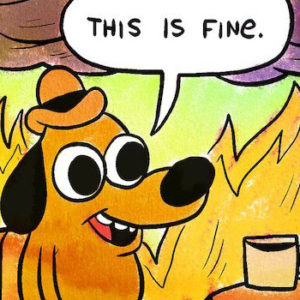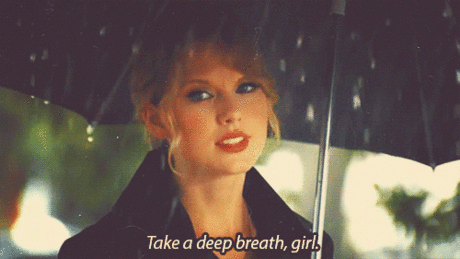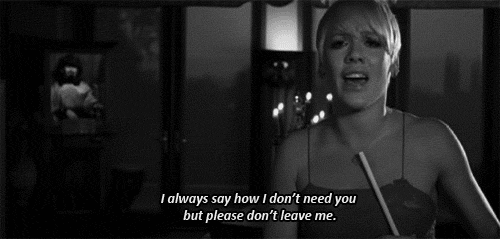When I find myself in times of trouble,
Mother Mary comes to me
Speaking words of wisdom:
Let it be.
– The Beatles
When I was a senior in college – and I know this will come as a shock to you – I failed organic chemistry.
I have asked myself quite a bit, in the years from that day to this, why that happened. Why did I struggle so much, not just with orgo, but with college in general? Why did I go from the top of my graduating class in high school to the bottom of my class in college?
I think there are many reasons. But undoubtedly one of them is that I got so caught up in the fear of failure and of being left behind that I forgot some very important things: the fun and excitement of learning, and the innate elegance of biochemistry. And, in fact, when I taught myself to see multistep synthesis problems as puzzles instead of just test questions, my grades got so much better. So really, these things held me back from success … that tiny seed of fear that sat at the center of everything I did, and my ingrained view of chemistry class (and physics, and math, etc. forever) as something to be dreaded and endured.
At this point, you may be wondering what my performance in college has to do with forgiveness. Let’s switch to another story.
In July 2014, someone hurt me very badly – badly enough to alter the course of my development as a person. I am still realizing the magnitude of the impact this event has had on my life. And I definitely, certainly have PTSD resulting from it. I was diagnosed with that this year.
It took close to four years for me to realize that yes, my PTSD was real and valid. Four years to be diagnosed and begin appropriate treatment.
And that is what I’ve been angry about recently.
Strangely, I’ve never felt angry or resentful towards the person who actually hurt me. I know that they were probably sick and not acting rationally. I’ve just … you know … felt angry towards everyone else.
I was expected to go back to work the day after the event, with no time to process what had happened or seek treatment.
People made jokes about what had happened – sometimes to make me feel better – sometimes because the nature of this crime is so shameful, and so disgusting, that you can’t really help but laugh to take some of the horror away.
Then there was the victim blaming – why didn’t you fight back? Why did you make yourself vulnerable?
And then there was the authorities’ response. The perpetrator was detained for questioning and I got to fill out an incident report form. As far as I know, they threw that form in the trash the second I walked out the door. I was never contacted by anyone – law enforcement, victim support agencies – no one.
The cumulative effect of all of this was to make me feel insignificant, like what had happened to me didn’t matter. I felt betrayed, and resentful, and lonely, and very, very angry. And all these dark emotions sat deep inside me, like a lump at the bottom of my throat, for years.
So, how do you forgive something like this?
You don’t. Or, at the very least, you don’t have to. Not right away.
The word forgiveness generally carries connotations of not feeling angry or resentful towards the offending party. If you have forgiven someone, then you aren’t seeking punishment or recompense anymore.
But acceptance? That’s different.
For the longest time, I fought back the memories of what had happened. I refused to acknowledge my symptoms of PTSD. Nope, everything was perfectly normal and I was fine. And, if not, that’s what affirmations and positive thinking are for, right?
I love myself, I thought, even as I struggled to wash my face because it wasn’t my face anymore but someone else’s.
I’m just trying to eat healthier, I said as I avoided the canned meats aisles in Fiesta (PTSD triggers are weird, man.)
I even remember congratulating myself on recovering so quickly. I must have a really good support system, I thought.

Source.
And meanwhile, the darkness inside me spread and poisoned everything it touched.
The only way to stop that darkness is to acknowledge its presence. Hence, acceptance. Some things are in the past and can’t be changed – what happened to me, society’s response to it, and the stupid and reckless things I did to try to keep the darkness locked away. Some things exist now and shouldn’t be changed. Did you know it’s okay to feel resentful and betrayed? That it’s okay to be angry at people who hurt you? Because I sure the Heck didn’t.
And once you’ve allowed yourself to feel all those things? All the gross, toxic, painful feelings that have been building up for months and years? You take a deep breath

and you let them all go.
It is one of the best feelings I have ever felt in my entire life. Reclaiming my dignity, bodily integrity, and personal agency from the people who took it away? Priceless.
Forgiveness comes later, I think … much later, after all the grieving and healing is done, and after the past is accepted. Have I forgiven the people who made those crude jokes, or who victim blamed me, or who told me my PTSD wasn’t “real” because I’m not a war veteran? Not yet. But maybe I will one day. All those things have already been said, after all … and the people who said them don’t even exist anymore. They are past versions of people I know. And when those hurtful things pop up in my mind during quiet moments, as they often do? Breathe in, breathe out … let them go. Let the darkness dissipate.
And you know what’s even better? Nothing is ever “all bad.” No abusive relationship or traumatic event is so bad and painful that I (we?) can’t learn and grow from it. All it takes is a bit of creative thinking – an adjustment here, a slight tweak there – and a horrific multistep synthesis problem becomes a fun puzzle. A reportable crime (that was somehow .. you know … not reported) becomes a catalyst for growth and healing.

Pictured: fun. I think.
I’m going to end this with my favorite quote from one of my favorite movies, that I would probably put on our wedding program if it wouldn’t seem weird in that context.
At times the world can seem an unfriendly and sinister place. But believe us when we say there is much more good in it than bad. And what might seem to be a series of unfortunate events may in fact be the first steps of a journey.
Forgiveness … we’ll get there. One step at a time.







You must be logged in to post a comment.